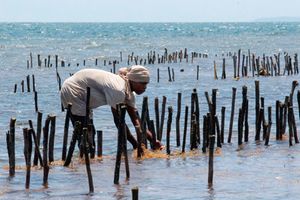
Africa is on the frontlines of climate disruption.
At the end of April, I tuned in as the Brookings Institution convened five leading candidates vying to become the next president of the African Development Bank (AfDB). It was a timely conversation — the selection of the Bank’s leadership signals a change in personnel and also the direction of Africa’s development priorities in a rapidly changing world.
The election of the African Development Bank (AfDB) president is a pivotal moment in global development, as this institution plays a central role in shaping Africa’s economic trajectory, infrastructure advancements, and climate resilience. With 81 member countries, including influential global powers such as the United States, China, and France, contributing capital and shaping policy, the AfDB wields significant influence over investment flows and economic strategies across the continent.
The president’s leadership sets the bank’s strategic priorities, directly affecting Africa’s development path while influencing broader global economic stability, trade relations, and climate initiatives. The election is closely scrutinised because candidates must navigate a delicate balance between the interests of African nations and the expectations of powerful non-African donors.
This leadership decision holds profound implications for addressing Africa’s most pressing challenges, including debt burdens, resource mobilisation, climate impacts, and sustainable development. Ultimately, the next AfDB president will not only shape Africa’s economic future but also redefine its role within the global development landscape, determining how effectively the continent leverages investments, fosters innovation, builds lasting resilience, and strengthens its influence in international financial discourse.
Impacts of climate change
In 2015, when Dr Akinwumi Adesina stepped into this role, he introduced the now widely recognised “High 5s”: Light up and Power Africa, Feed Africa, Industrialise Africa, Integrate Africa, and Improve the Quality of Life for the People of Africa. Under his tenure, the AfDB strengthened Africa’s voice in global finance and cemented its place as a key development institution on the continent.
Yet during this most recent forum, something vital was missing: a robust debate about how Africa prepares for the worst impacts of climate change. I listened closely to the candidates’ visions, and while there were compelling proposals for growth, integration, and reform, there was little acknowledgement of the most existential threat of our time — the climate crisis — or how Africa would finance its response. Perhaps the omission was due to time constraints. But in a moment, this consequential silence on climate finance is a missed opportunity.
Africa is already living with the consequences of a crisis it did not create. From floods across East Africa to increasingly frequent cyclones battering our coastal cities, the continent is on the frontlines of climate disruption. And the economic cost is staggering. As Benedict Oramah, President of Afreximbank, rightly noted, Africa is losing five per cent of its GDP annually to climate-related challenges.
Despite this, Africa receives a mere three to four per cent of global climate finance. That is alarmingly inadequate for a continent that holds nearly 19 per cent of the world’s population. According to the Climate Policy Initiative, Africa needs $250 billion annually from 2020 to 2030 to finance climate adaptation alone. Yet at COP29, wealthy nations pledged only $300 billion over several years for all developing countries with Africa currently receiving only a fraction of what is needed.
Transformative leadership
This is untenable. And it is why the AfDB’s next leader must place climate finance squarely at the top of their agenda. We need transformative leadership that sees climate finance not as a niche issue, but as part of the engine for equitable and sustainable development.
AfDB has already proven it can lead. The Noor Ouarzazate Solar Complex in Morocco, supported by the Bank, is the world’s largest concentrated solar power plant — delivering electricity to over a million people while slashing carbon emissions by hundreds of thousands of tonnes annually.
The AfDB is now rolling out a second major electricity-generation initiative: the Desert-to-Power (D2P) project. Once complete, it will transform the Sahel into one of the largest solar power–generating regions in the world. The project will expand solar infrastructure across 11 Sahelian countries, with an ambitious goal to connect 250 million people to electricity — a game-changer for energy access in the region. The Bank’s current 10-year strategy also prioritises climate resilience.
But plans on paper are not enough. This is a critical inflection point. The next AfDB president must not simply inherit a climate strategy, they must champion it.
These are not isolated success stories — they are proof that African-led, climate-focused finance mechanisms can work when driven by leadership that believes in them. These incredible stories should not be the exception, they must be part of our African story. What we need now is scale. Vision. Urgency. The next AfDB president must recognize climate finance as a development imperative and an important part of Africa’s long-term prosperity and stability.
Ms Mathai is the MD for Africa & Global Partnerships at the World Resources Institute and Chair of the Wangari Maathai Foundation







